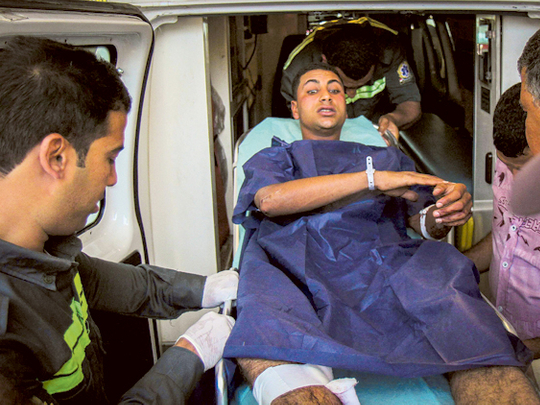
Cairo: Bombers killed a policeman and a soldier in Egypt Friday, hours before campaigning starts in presidential polls which the former army chief who deposed the elected Islamist leader is expected to win.
Militants have unleashed a wave of attacks targeting security forces since presidential front-runner Abdul Fattah Al Sissi ousted Mohammad Mursi in July.
The army led by the now retired field marshal also installed an interim government that has waged a deadly crackdown on Mursi’s supporters and his Muslim Brotherhood movement.
A bomb struck a traffic police kiosk near a courthouse in the north Cairo district of Heliopolis, killing one policeman and wounding four others, interior ministry spokesman Hany Abdul Latif said.
The interior ministry later said the bomb had been concealed in a traffic light.
The attack came just hours after two suicide bombers attacked a checkpoint and a nearby bus outside the South Sinai provincial capital Al Tur, security officials said.
A soldier was killed and six policemen wounded by the first bomber, and five civilians wounded by the second, the officials said.
Security forces have deployed in strength to protect the resorts along the South Sinai coast that are a major plank of the country’s battered tourism sector.
Friday’s bombings came a day before the start of official campaigning in the May 26-27 presidential election which will see leftist leader Hamdeen Sabbahi as Al Sissi’s sole rival.
Sabbahi came third in the 2012 election which Mursi won, and is seen by supporters as the only leader representing the aspirations of those who revolted against longtime strongman Hosni Mubarak in 2011.
A statement from the prime minister’s officer said, meanwhile, that Friday’s violence would not undermine Egypt’s determination to hold “fair presidential and parliamentary polls”.
Mursi’s Brotherhood, which swept all elections since Mubarak’s fall, is blacklisted as a “terrorist” organisation and said it will boycott the polls.
Mursi’s ouster, and the ensuing crackdown on his supporters that has killed more than 1,400 people since he was removed from office, has deeply polarised the country.
Top Brotherhood leaders, including Mursi, are behind bars and facing a flurry of trials.
The ongoing crackdown has also seen more than 15,000 Mursi supporters jailed, with hundreds of them sentenced to death in often speedy trials.
On Monday, a judge in the central city of Minya triggered a global outcry by sentencing to death 683 alleged Islamists including Brotherhood chief Mohammad Badie, after just a 10-minute session.
Furious over the police crackdown on Mursi’s supporters, militants have killed scores of soldiers and police in the past few months, mostly in the north of the mainly desert Sinai Peninsula.
But the jihadists have extended their reach to Cairo and the Nile Delta, carrying out a series of high-profile attacks in the heart of the capital.
The Al Qaida inspired Ansar Beit Al Maqdis (Partisans of Jerusalem) group has claimed the deadliest attacks in and outside the Sinai Peninsula.
Another shadowy jihadist group, Ajnad Misr (Soldiers of Egypt) has claimed recent explosions in the Egyptian capital, vowing new attacks against security forces.
The authorities say militants have killed around 500 people, most of them security personnel, in such attacks since July.












